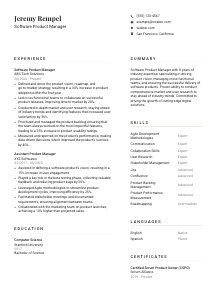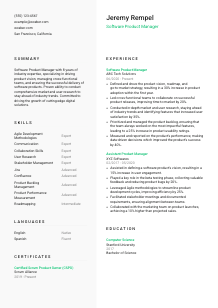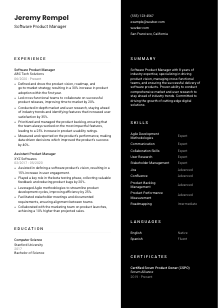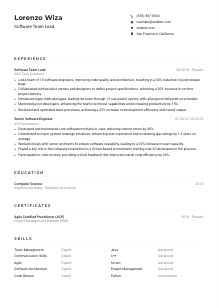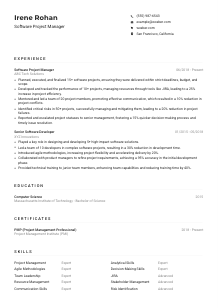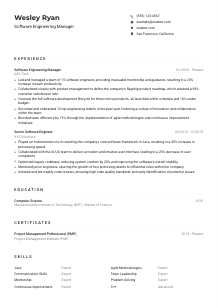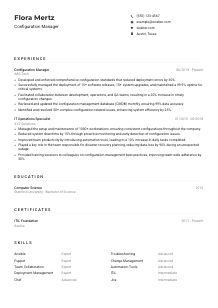Software Product Manager Resume Example
Juggling production timelines, but your resume seems like a beta version? Gear up with this Software Product Manager resume example, streamlined using Wozber free resume builder. Learn how to architect your software strategy to match job requirements, so your career roadmap leads to the next big launch!
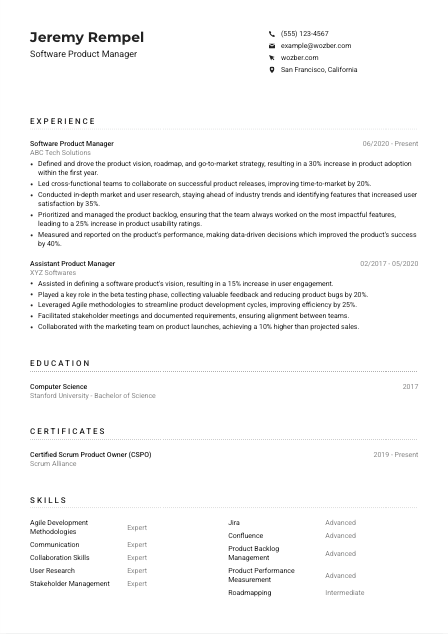
How to write a Software Product Manager Resume?
Ah, the journey of a Software Product Manager - a unique blend of technology, strategy, and leadership. Your resume is not just a document; it's a launchpad for your next big career move. With the competitive edge sharper than ever, your resume needs to stand out, clearly communicating your value proposition. Enter the realm of ATS-compliant resumes with the Wozber free resume builder.
This guide dives deep into tailoring your resume to capture the essence of your expertise, ensuring it speaks directly to the job requirements. Ready to engineer a resume that competently showcases your software management prowess? Let's code our way through.
Personal Details
First impressions count, and in the digital age, your personal details section is where this journey begins. Optimizing this section is crucial, as it sets the groundwork for your application. Let's tailor this with precision, ensuring it aligns perfectly with the Software Product Manager role.
1. Clarify Your Identity
Your name isn't just a label; it's your brand in the professional world. Ensure it's highlighted with a clear, professional font, setting the stage for the impactful introduction that follows. In the ethos of software product management, think of it as your user interface - clean, user-friendly, and error-free.
2. Match the Role
Mimicking the job title just below your name serves dual purposes - it customizes your resume and employs a dose of ATS optimization, making those algorithms recognize you as a viable candidate. For instance, "Software Product Manager" directly mirrors the desired position, acting as a prime keyword for ATS.
3. Opt for Efficient Communication Channels
Your contact information should enable potential employers to reach you without a glitch. Emphasize a professional email format (e.g., firstname.lastname@email.com) and double-check for accuracy. This isn't just about providing details; it's about showcasing your attention to detail - a crucial trait for any Software Product Manager.
4. Location, Location, Location
"San Francisco, California" isn't just a detail; it's a strategic advantage. It signals to potential employers that you're in the heart of tech innovation or willing to be a part of it. Plus, it directly aligns with the job's geographical requirements, removing any doubts about relocation.
5. Showcase Your Professional Persona
Including a link to a professional profile or personal website is like handing out a dynamic business card. It invites potential employers to explore your professional landscape further, ensuring they see the breadth of your capabilities and achievements.
Takeaway
The Personal Details section is the handshake before you step into the interview room. It sets the tone for the narrative that follows, blending professionalism with your unique personal brand. Remember, in the realm of software product management, every detail counts. Get this right, and you've effectively made your first pitch.





Experience
Your experience section is where the plot thickens, narrating your journey through the realms of software product management. This isn't just about listing roles; it's about sculpting your narrative in a way that resonates with your prospective employer. Aligning it with the job description requires more than just surface-level adjustments; it demands a strategic approach. Let's dive in.
- Defined and drove the product vision, roadmap, and go‑to‑market strategy, resulting in a 30% increase in product adoption within the first year.
- Led cross‑functional teams to collaborate on successful product releases, improving time‑to‑market by 20%.
- Conducted in‑depth market and user research, staying ahead of industry trends and identifying features that increased user satisfaction by 35%.
- Prioritized and managed the product backlog, ensuring that the team always worked on the most impactful features, leading to a 25% increase in product usability ratings.
- Measured and reported on the product's performance, making data‑driven decisions which improved the product's success by 40%.
- Assisted in defining a software product's vision, resulting in a 15% increase in user engagement.
- Played a key role in the beta testing phase, collecting valuable feedback and reducing product bugs by 20%.
- Leveraged Agile methodologies to streamline product development cycles, improving efficiency by 25%.
- Facilitated stakeholder meetings and documented requirements, ensuring alignment between teams.
- Collaborated with the marketing team on product launches, achieving a 10% higher than projected sales.
1. Deconstruct the Job Requirements
Every bullet point, every role you've held is a pixel in the larger picture of your career. Start by mapping your responsibilities and achievements to the listed job requirements. This is your storyboard; ensure each element from your past roles speaks to skills and experiences like Agile development methodologies, collaboration, or market research citing the job description's language.
2. Frame Your Career Narrative
Present your journey in a way that shows progression, learning, and success. For each position, including your job title and the company's name positions you within the narrative of your career. Dates of employment give it a timeline, anchoring your story in reality and showcasing your dedication and growth within the field.
3. Highlight Your Milestones
Here's where you turn your actions into measurable achievements. Did you lead a team to launch a successful product? Did your strategy increase product adoption? Quantify these milestones. For example, "Defined and drove the product vision, roadmap, and go-to-market strategy, resulting in a 30% increase in product adoption." These are your victories; display them proudly.
4. Quantify Your Impact
Numbers speak louder than words. They provide a concrete measure of your contributions and successes. Whenever possible, quantify your achievements; this not only catches the eye of potential employers but also feeds into the ATS system's love for tangible metrics.
5. Focus on Relevance
In the vast domain of experiences, choose the ones that shine a light on your suitability for the Software Product Manager role. Irrelevant achievements, no matter how impressive, can cloud your narrative. Keep your eye on the target; every line on your resume should bring you one step closer to that job interview.
Takeaway
Your experience section is not just a list; it's a testament to your journey, your challenges, and your triumphs. As you walk the hiring manager through your past, ensure each step is strategically placed to lead you to your desired role. This isn't just history; it's your professional saga, tailored for the role of a Software Product Manager.
Education
In the world of Software Product Management, your educational background is not just about degrees; it's about establishing the foundation of your expertise. Just like a software product, your education needs to be user-friendly, i.e., easy for HR managers and ATS to understand and appreciate. Let's ensure your educational credentials are featured in a way that resonates with the role.
1. Highlight the Prerequisites
Identify and mirror the educational requirement specified in the job description. This ensures that you're ticking off a crucial checkbox in the ATS system and the hiring manager's checklist. For example, if the role specifies a "Bachelor's degree in Computer Science," make sure your degree is front and center.
2. Keep It Structured
Simplicity is key. Present your academic qualifications clearly and concisely, ensuring that the structure (Degree, Field, University, Graduation Date) is straightforward. This not only aids readability for humans but also simplifies parsing for ATS systems.
3. Align Your Degree with Job Requirements
If the job requirement specifies a particular field of study, as in this case with Computer Science, make sure that is plainly visible. This direct alignment with job requirements makes your resume more relevant and, thus, more likely to pass screening, both by machines and humans.
4. Mention Relevant Extra-mile Achievements
If your education journey includes accolades, projects, or extracurricular activities that highlight skills relevant to the Software Product Manager role, mention them. However, prioritize the relevance and level of the position you're applying for - your aim is to bolster your qualifications, not overshadow them with unwarranted details.
5. Consider Other Educational Highlights
Beyond the degree, if there are certifications, workshops, or additional courses that boost your claim to the Software Product Manager role, list them. This shows continuous learning - a crucial attribute in the tech field.
Takeaway
Your education section reflects the foundation upon which your career is built. By carefully structuring this section and aligning it with the job requirements, you ensure that your resume passes both the human and the ATS scrutiny. Remember, in the context of software product management, it's not just about what you know, it's about demonstrating that your knowledge is directly applicable to the role at hand.
Certificates
In the fast-paced world of software development, staying updated with the latest trends and methodologies is crucial. Certifications add an extra layer of expertise and dedication to your resume. Let's make sure your certifications complement your profile and make you stand out as a Software Product Manager.
1. Tailor Your Certifications
Focus on certifications that directly address the said job description. For instance, 'Certified Scrum Product Owner (CSPO)' directly signifies your expertise in Agile methodologies, a key requirement for the role. This step is about matching your certifications with the job's demands, ensuring relevancy.
2. Prioritize Pertinence
While it might be tempting to list all your certifications, prioritize those most relevant to the Software Product Manager role. This targeted approach ensures that the hiring manager sees the most pertinent information first, making a stronger impact.
3. Transparency with Dates
Including the dates of certification helps signal your commitment to staying updated in your field. For roles in rapidly evolving sectors like technology, showing recency in your certifications can be particularly beneficial.
4. Commit to Continuous Learning
Technology and methodologies evolve; so should you. Regularly updating your certifications and highlighting recent learning endeavors demonstrates your dedication to professional growth, a highly valued trait for any Software Product Manager.
Takeaway
Your certificates are proof of your commitment to excellence and keeping abreast of the latest in software product management. By strategically selecting and presenting your certifications, you reassure potential employers of your expertise and dedication to your professional development. Ensure these credentials shine on your resume, exemplifying your continuous journey toward excellence.
Skills
The skills section is your chance to display the toolbox of your expertise. In a role that combines technology with leadership and strategy, showcasing a balanced mix of technical and interpersonal skills is key. Let's fine-tune this section to reflect the unique blend of abilities a Software Product Manager must possess.
1. Decode the Job Description
Extract both explicit and implicit skills from the job listing. For example, familiarity with 'Agile methodologies' and 'Jira' are explicitly mentioned, hinting at the need for technical prowess. Meanwhile, 'leadership' and 'communication' skills, though perhaps not itemized, are implicitly required for success in the role.
2. Showcase Relevant Skills
Balance your resume with both hard and soft skills relevant to a Software Product Manager. Articulate your expertise in 'Agile Development Methodologies' and proficiency in using 'Jira and Confluence.' Simultaneously, don't forget to highlight your 'exceptional communication' and 'leadership' skills. This strategic balance paints a comprehensive picture of your capability.
3. Organize for Impact
While you might possess a vast array of skills, prioritizing them for visibility is crucial. Arrange your skills in a manner that highlights your strongest suits first, ensuring they're not lost in a sea of text. This approach ensures the hiring manager sees the most relevant skills at a glance, enhancing the impact of your resume.
Takeaway
The skills section of your resume is where you get to shine the spotlight on what you bring to the table. By carefully selecting and artfully presenting your skills, you make a compelling case for why you are the ideal candidate for the Software Product Manager role. Approach this section as a curated exhibition of your professional prowess, each skill a testament to your potential to excel.
Languages
In a role that often requires collaboration with global teams and stakeholders, linguistic skills can be a significant asset. Let's harness the power of your multilingual abilities to enhance your appeal as a Software Product Manager, showing that you're not only technically proficient but also a global communicator.
1. Reiterate Job Language Requirements
Firstly, ensure you meet the minimum language requirement mentioned in the job description ('Must be conversant in English'). Position this prominently in your languages section to immediately satisfy this essential criterion.
2. Feature Your Linguistic Range
Beyond the basic requirement, listing additional languages you're proficient in can set you apart. For a Software Product Manager, being able to communicate with global teams or understanding regional market nuances can be invaluable. Feature languages that add value to the role you're applying for, ranking them by proficiency.
3. Clarify Your Proficiency
Be clear about your level of proficiency for each language listed. Use terms like 'Native,' 'Fluent,' 'Intermediate,' or 'Basic' to provide the hiring manager with an accurate gauge of your linguistic capabilities. This clarity can play a pivotal role, especially in roles requiring precise communication.
4. Leverage Multilingual Abilities
For roles that have an international scope or involve liaising with users or teams across different geographies, your multilingual abilities can be a powerhouse of potential. Highlight how this skill set positions you to bridge communication gaps and foster better collaboration.
5. Embrace the Role of a Global Citizen
Your ability to speak multiple languages reflects more than just linguistic skills; it showcases cultural empathy and adaptability - crucial traits for roles that operate on a global scale. Present your language skills as a bridge to new opportunities and experiences, enhancing your role as a Software Product Manager.
Takeaway
Languages are more than just a means of communication; they're tools that enable you to engage more deeply with the world. For a Software Product Manager, they can enhance your ability to manage products for a global audience. Showcase your linguistic proficiency as a part of your unique professional identity, and let it amplify your candidacy.
Summary
Your summary is the elevator pitch of your resume - a concise, powerful statement that encapsulates your professional identity and value proposition. Tailoring this section to the Software Product Manager role requires a strategic blend of specificity and brevity. Let's craft a summary that differentiates you right off the bat.
1. Distill the Essence of the Role
Take a moment to absorb the core requirements and responsibilities of the role. This understanding will be the foundation of your summary, ensuring it's aligned with what the hiring manager is looking for. Highlight your experience and skills that directly address these needs, like your proficiency in Agile methodologies and a proven track record of delivering successful software products.
2. Start with a Bold Introduction
Begin with a strong statement that introduces you as a professional. For example, 'Software Product Manager with 8 years of industry expertise' not only establishes your experience level but also positions you within the specific realm of the job.
3. Highlight Key Achievements and Skills
Select a few of your career highlights and skills that best match the job description. Demonstrating how you've driven product vision, managed cross-functional teams, and delivered successful software products directly speaks to your competence and aligns with the job's expectations.
4. Keep it Snappy
Remember, the summary is your teaser, drawing the hiring manager in to read more. Keep it to 3-5 lines, ensuring it's impactful and to the point. This is your chance to make a memorable first impression, so make every word count.
Takeaway
A well-crafted summary can be your resume's best advocate, inviting the hiring manager to delve deeper into your qualifications. By succinctly showcasing how your experience and skills align with the Software Product Manager role, you set the stage for a compelling narrative that underscores your suitability for the position. Let your summary be the prologue to your professional story, vividly capturing your potential.
Ready for Launch: Concluding Your Resume Build
Congratulations on completing a thorough crafting of your Software Product Manager resume! With each section meticulously tailored to reflect your suitability for the role, you're now equipped to embark on your job-search journey with confidence. Remember, your resume is a dynamic document – continually refine it as you gather new skills and achievements. Leveraging the Wozber free resume builder, including access to ATS-friendly resume templates and the ATS resume scanner, ensures your resume not only meets but exceeds industry standards.
Now, it's time to send your resume into the world, a beacon of your professionalism and readiness to elevate your career. The pursuit of your next great role awaits—best of luck!

- Bachelor's degree in Computer Science, Engineering, or a related technical field.
- Minimum of 5 years experience in software product management or related roles.
- Strong understanding of Agile development methodologies and experience with agile tools such as Jira and Confluence.
- Proven track record of managing and delivering successful software products.
- Exceptional communication, leadership, and collaboration skills.
- Must be conversant in English.
- Must be located in or willing to relocate to San Francisco, California.
- Define and drive the product vision, roadmap, and go-to-market strategy.
- Collaborate with cross-functional teams including engineering, design, and marketing to ensure successful product releases.
- Conduct market and user research to stay ahead of industry trends and user needs.
- Prioritize and manage the product backlog, ensuring that the team is working on the most impactful features.
- Measure and report on the product's performance, making data-driven decisions to improve its success.





